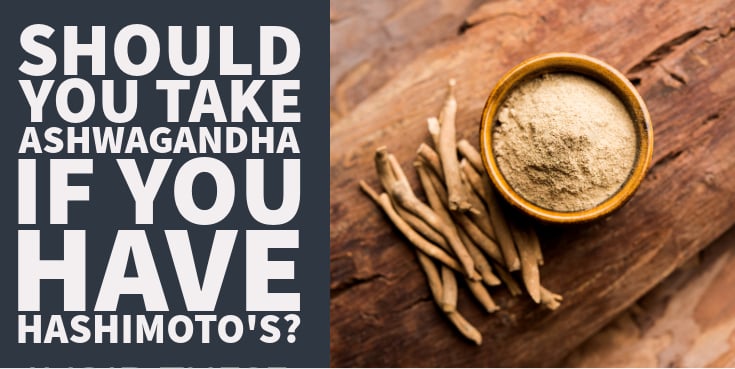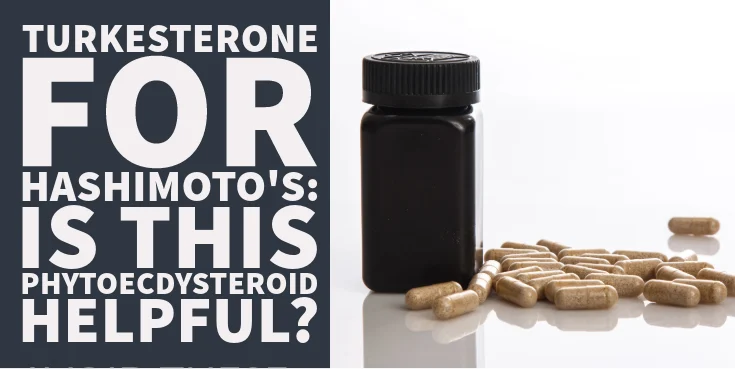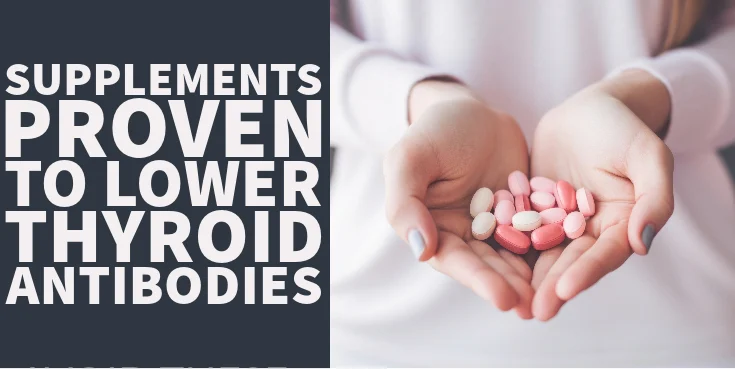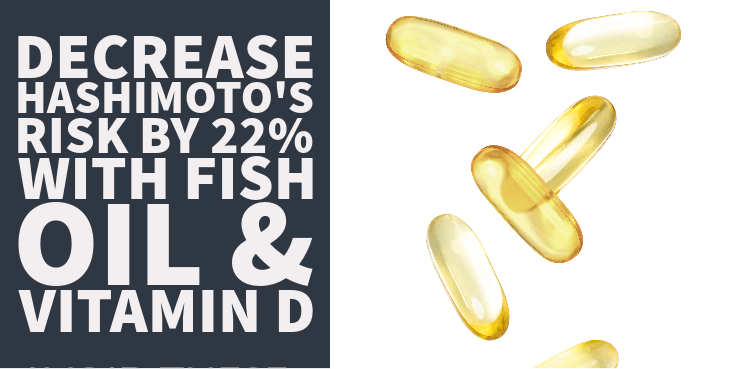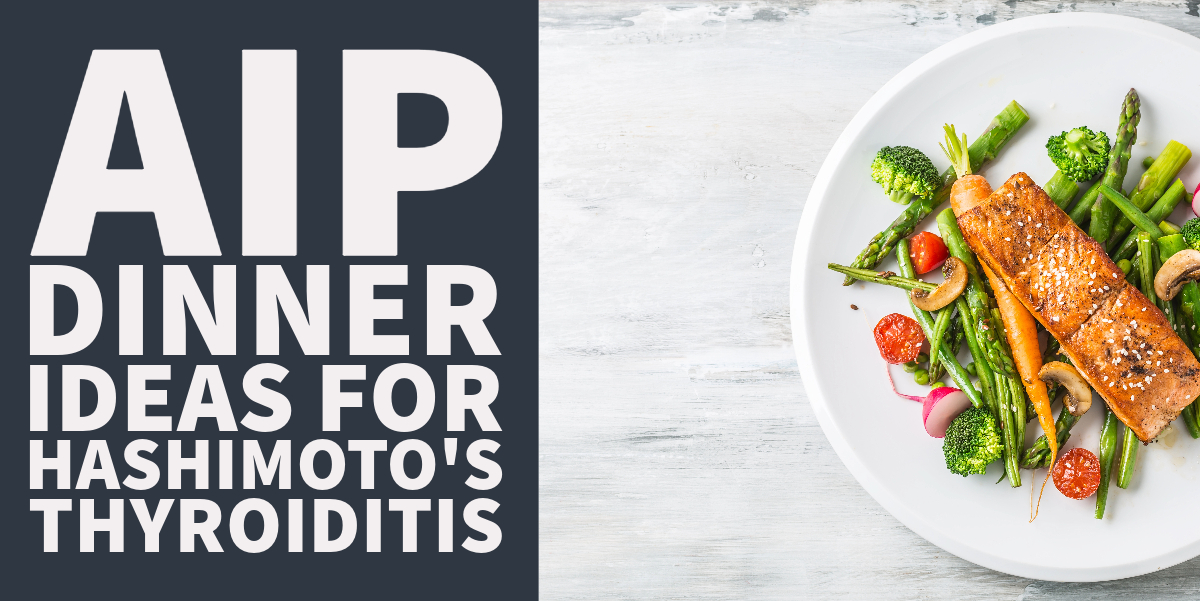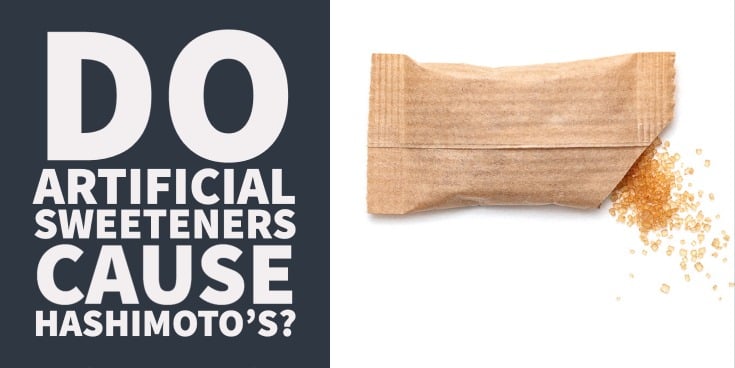Some myths in the thyroid community tend to linger far longer than they should and one of those is the idea that ashwagandha is somehow harmful to patients with Hashimoto’s thyroiditis.
Some information on the internet would have you believe that this adaptogenic herb should be avoided if you have Hashimoto’s because it can make your thyroid worse but that’s not true at all.
Here’s the truth:
Ashwagandha is an amazing natural herbal treatment that is both safe and effective for patients with Hashimoto’s.
Not only can it support thyroid function directly, it also has the potential to support adrenal health, testosterone levels, and the immune system, all of which are indirectly beneficial to patients with autoimmune thyroid disease.
So why then do some people believe it’s harmful?
There are three main reasons for this belief but we can easily debunk each one:
DOWNLOAD FREE RESOURCES
Foods to Avoid if you Have Thyroid Problems:
I’ve found that these 10 foods cause the most problems for thyroid patients. Learn which foods you should avoid if you have thyroid disease of any type.
The Complete List of Thyroid Lab tests:
The list includes optimal ranges, normal ranges, and the complete list of tests you need to diagnose and manage thyroid disease correctly!
Why People Say Ashwagandha is Harmful:
#1. It May Cause Hyperthyroidism
For those who are unfamiliar with ashwagandha, here’s some brief information to bring you up to speed:
Ashwagandha is an adaptogenic herb that comes from an evergreen shrub native to Asia and Africa.
As a natural therapy, it’s been safely used for thousands of years in Ayurvedic medicine.
More recently, it’s been the subject of a significant amount of research that supports what it was used for anciently.
One of these ancient uses that has been supported by modern research is its thyroid-boosting properties.
Many people know about this property which is why you’ll often find ashwagandha in thyroid-support supplements and why many thyroid patients take it.
And it’s this thyroid-boosting property that some people completely misunderstand.
When you look at Hashimoto’s at a high level, you will find that most people with this condition end up in a hypothyroid or low thyroid state.
While it is true that sometimes Hashimoto’s can cause hyperthyroidism, this is actually pretty uncommon and only happens in around 5-10% of people.
But given this information, you can see how the myth that ashwagandha causes hyperthyroidism may be propagated.
There will almost certainly be some people with Hashimoto’s who are in the hyperthyroid state (which, again, is unusual) who have taken ashwagandha and will attribute some or all of their symptoms to this natural treatment.
On top of this, there’s been at least one case-report study (1) that showed one patient who took ashwagandha for 2 years ended up with a hyperthyroid condition called thyrotoxicosis that went away once ashwagandha was stopped.
Between the single case report study and anecdotal evidence, there’s a small but vocal minority of people who are trying to sound the alarm on ashwagandha.
But none of this evidence is very convincing, especially when you look at additional research.
Studies like this one (2), and this one (3), show that ashwgandha supports and normalizes thyroid function as opposed to inducing hyperthyroidism.
We also have studies like this one (4), done in healthy volunteers, which further support the idea that it doesn’t cause hyperthyroidism.
So does that mean that there’s no possible chance it can ever cause hyperthyroidism?
Not necessarily.
It’s certainly possible that in a very rare subset of patients it can, but this number would be incredibly low.
Even if the number were higher at something like 1% of people, that still wouldn’t justify telling the other 99% of people to stop taking it.
At the end of the day, ashwagandha functions more as a thyroid-balancing supplement, not as a thyroid-boosting supplement.
Meaning that if your thyroid is low, it can help bring it up and if your thyroid is too high, it can help bring it down.
Even in the case study I mentioned above, it seems very difficult to pin this patient’s symptoms on ashwagandha given that she had used it for 2 years straight without experiencing any issues.
It seems more likely that it wasn’t ashwagandha that caused her thyrotoxicosis but probably actual thyroid hormones that are sometimes included in thyroid support supplements to make them more powerful (this is illegal, but it doesn’t stop unscrupulous actors from adding them).
#2. It’s a Nightshade
If it’s not hyperthyroidism then the next most common complaint you’ll see about ashwagandha has to do with its heritage.
Ashwagandha is technically a part of the nightshade family which is a diverse family of plants that includes foods like peppers, eggplant, tomato, potato, ashwagandha, and many others.
If you’re a Hashimoto’s veteran then there’s a very high chance that you are familiar with a special diet often used to treat Hashimoto’s called the AIP diet.
And in this diet, nightshades are forbidden because they contain a combination of lectins and plant alkaloids which can, theoretically, exacerbate the immune system.
This theory is supported by the fact that there are plenty of anecdotal reports that going on the AIP diet can help reduce thyroid antibodies and may even put Hashimoto’s into remission in some cases.
And I’ll throw in my two cents here to say that while I’m not a huge fan of the AIP diet, I have certainly recommended it to patients in the past and have seen success with it.
So isn’t that the smoking gun that we’ve been looking for to prove that ashwagandha shouldn’t be taken if you have Hashimoto’s?
Not at all.
For starters, magnitude matters here.
There’s absolutely no way that you can compare the contents of a tomato or eggplant to that of a 200 mg serving of ashwagandha that fits into a small capsule.
Going based purely on volume and size, the actual amount of potentially harmful compounds found in ashwagandha supplements would be tiny compared to whole foods.

In addition, there’s really no evidence in the form of research to support the idea that nightshades are harmful to all people who have autoimmune diseases including Hashimoto’s thyroiditis.
All we see thus far are anecdotal reports that some patients do better when they are avoided.
But you could say the same thing for virtually any food or any ingredient found in supplements.
Some people tolerate dairy just fine while others don’t. Etc.
Some people tolerate ashwagandha just fine while others do better on rhodiola. Etc.
In other words, the benefit of avoiding nightshades is based more on personal genetics and tolerance than anything else.
But even if we assumed the worst and said that ashwagandha does contain harmful compounds and those compounds cause problems for patients with Hashimoto’s it still wouldn’t matter.
Why? Because determining whether or not you do something is a matter of weighing the pros and the cons.
And in this case, the pros far outweigh the cons.
Ashwagandha has been documented to provide real benefits to things like:
- Sleep (5)
- Testosterone and DHEA (6)
- Anxiety and stress (7)
- Physical performance (8)
- Sexual performance (9)
So taking a small hit to your immune system would be dwarfed by the huge number of benefits provided.
Does that mean it’s suited for every patient with Hashimoto’s?
Definitely not, as there will always be outliers and people who are incredibly sensitive to small amounts of the compounds found in nightshades.
But, again, we have another situation where only a small fraction of people don’t tolerate ashwagandha and this small fraction is not enough to tell the majority they shouldn’t use it.
#3. Because It Can Boost The Immune System, It May Make Hashimoto’s Worse
This one isn’t as common as the other two reasons but there are a handful of people who recommend against ashwagandha because of its immune-stimulating benefits.
These same people will try to suggest that because ashwagandha stimulates the immune system it may make Hashimoto’s worse because, after all, isn’t Hashimoto’s a disease of the immune system?
Well, yes, it is, but the underlying physiology is more complex than just saying the immune system is already overstimulated.
Instead, it’s a relative imbalance between two competing systems known as TH1 and TH2.
TH1 is responsible for inducing inflammation and the TH2 response counteracts it (10).
In states of autoimmune disease, there is overstimulation of the TH1 response and understimulation of the TH2 response.
This is why treatments that “boost” the immune system (think vitamin D and zinc) are still beneficial for those with Hashimoto’s because they balance out these two systems.
So, no, the fact that ashwagandha has immune-stimulating properties (11) is not a concern for those with Hashimoto’s.
So, Is It Safe?
Here’s how I would answer that question:
For the vast majority of patients with Hashimoto’s, ashwagandha is not only safe but it is likely to provide several benefits.
For a small minority of patients with Hashimoto’s, especially those who are extremely sensitive to nightshades, it may cause problems.
Based on my experience, I would estimate that there’s roughly an 80% chance that someone with Hashimoto’s who took ashwagandha would see some benefit and roughly a 1-5% chance that it may cause problems.
This is also in line with one of the studies I mentioned above which showed that 4% of patients taking ashwagandha experienced problems while 12% of patients taking placebo claimed to as well (12).
It turns out that people are not very good at attributing symptoms to the things that actually deserve them.
The 15% difference between these two values is reserved for people who feel no difference when taking it, positive or negative.
This 1-5% population of people who see negative side effects may seem like a like but it’s right in line with other ingredients that thyroid patients take for thyroid support.
I can say this with a relatively high degree of confidence because I’ve had the advantage of providing thyroid support supplements to over 80,000 thyroid patients over the last 8 years and that’s what I’ve seen based on reviews and emails.
Whether it’s an ingredient like thyroid glandulars or a hormone like T2, there’s usually about an 80% chance that any given ingredient will provide benefit and roughly a 1-5% chance that it may cause problems for you.
This is why I always say that trial and error is pretty much always required when figuring out what supplements and ingredients work best for you.
What About Long-Term Use?
Some patients with Hashimoto’s will admit that ashwagandha is beneficial but they’ll add a caveat that it can only be used short term.
And, once again, there really isn’t any data to back up this statement either.
Here’s what we know:
While it is true that there have been no long-term studies to ‘prove’ that ashwagandha is safe, this isn’t the same thing as saying using it long-term is harmful.
It just means we don’t have the data.
But what we do have, is a very long and storied history from its use in Ayurvedic medicine.
And this history suggests that there are no issues in taking it long-term.
I should also add that based on my own experience, I’ve seen no issues in thyroid patients who have taken ashwagandha daily for several years.
Bottom Line
Whether or not ashwagandha works for you is more a matter of your personal genetics rather than the presence or absence of a certain type of thyroid disease.
Far more thyroid patients who use it will see benefits compared to those who experience problems.
And it’s for this reason that I’m hoping that the myth that ashwagandha causes problems for those with Hashimoto’s meets a swift demise.
If you are looking for an ashwagndha supplement then I would recommend checking out T3 Conversion Booster.
It contains a low (but effective) dose of ashwagandha along with other ingredients all designed to enhance T4 to T3 conversion.
Scientific References
#1. ncbi.nlm.nih.gov/pmc/articles/PMC9035336/
#2. pubmed.ncbi.nlm.nih.gov/28829155/
#3. ncbi.nlm.nih.gov/pmc/articles/PMC4296437/
#4. sciencedirect.com/science/article/pii/S0965229920319099
#5. pubmed.ncbi.nlm.nih.gov/34559859/
#6. ncbi.nlm.nih.gov/pmc/articles/PMC6438434/
#7. ncbi.nlm.nih.gov/pmc/articles/PMC6979308/
#8. ncbi.nlm.nih.gov/pmc/articles/PMC8006238/
#9. ncbi.nlm.nih.gov/pmc/articles/PMC9297375/
#10. ncbi.nlm.nih.gov/pmc/articles/PMC27457/
#11. ncbi.nlm.nih.gov/pmc/articles/PMC8397213/
#12. pubmed.ncbi.nlm.nih.gov/28829155/

